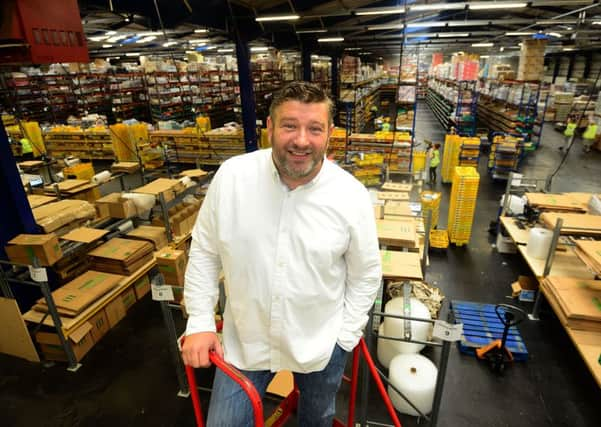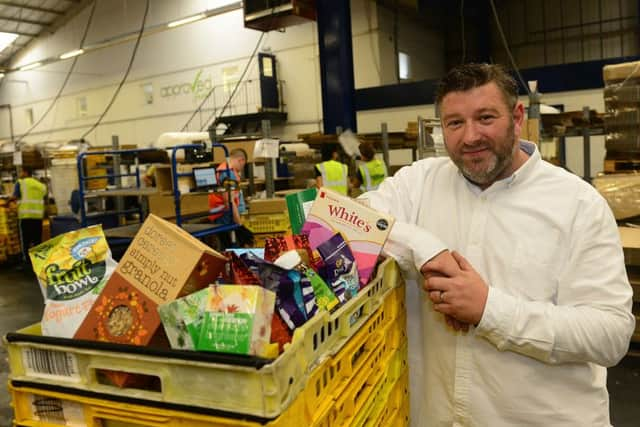Rejected by Dragons' Den, how Dan Cluderay had the last laugh


IT WAS 15 years ago this month, on the same day the planes hit the Twin Towers, that Dan Cluderay lost his job as an engineer at a mobile phone plant.
Desperate to stay afloat, he decided to follow his father-in-law into the market trade. The rest, as they say, is history.
Advertisement
Hide AdAdvertisement
Hide AdThis morning Dan is back behind the same stall from which he once sold his wares in Hull, Leeds and Doncaster. Except now it’s housed in the corner of a cavernous warehouse and the father-of-two is flogging his stock via live Facebook stream to an online audience numbering in the tens of thousands.


Dan’s brainwave – one worth millions of pounds each year – was to take the leftover goods from manufacturers and sell them at hugely discounted prices.
“Our customer base is totally diverse, the common thread is they want value for money,” he says as we take a tour of his premises on the outskirts of Sheffield, down aisles crammed with meticulously sorted food and household items that are being plucked from the shelves and placed into tray-laden trolleys by his busy team of pickers.
“What we do is take the problem stock direct from the producers, items that might be past their ‘best before’ date, have had a change of label or feature a competition that has already ended,” he explains.
Advertisement
Hide AdAdvertisement
Hide Ad“People often get confused and think there’s both a ‘use by’ and ‘best before’ date on each product. There isn’t. You find ‘use by’ dates on meat and fish, things that go in your fridge and freezer. A ‘best before’ date is a guide to the optimal quality.


“The truth is only about 20 per cent of it is out of date, but I’m happy to wear that cap because which major brand wants to be known as the company that sells out of date food?”
Supermarkets often won’t stock goods which are more than a quarter of the way into their assigned shelf life, which is where Dan steps in. “We don’t get any complaints from our customers about the quality of our food,” he says proudly. “Wee wouldn’t be in business if we did.”
His daily live Facebook appearances – today he’s plugging special offers that include an eight-pack of Coke Zero for 50p and 18 toilet rolls for £1.99 as assistant Kirsty films it on a smartphone – are a bit of fun to attract new customers through word of mouth (or rather Facebook ‘likes’ and ‘shares’).
Advertisement
Hide AdAdvertisement
Hide AdBut the success of his business model can be seen in the stacks of boxes that are steadily building up in another section of the warehouse, all packed up and ready to be whisked off to their destinations.
Labels bearing addresses in Sweden, Germany and Denmark show that our continental cousins enjoy a bargain just as much as the thousands of Brits who regularly buy from Dan’s website – approvedfood.co.uk – saving around £60 a week on their shopping bills.
Dan’s ethos is to sell his products at half the price, at least, of the lowest price they can be bought for elsewhere. As for the manufacturers, they are able to recoup money on products that would otherwise go to landfill.
“It’s an absolute crime in this day and age for any company to think they can plough things into the ground because their brand might be damaged,” says Dan. “People just don’t want to see manufacturers doing that.
Advertisement
Hide AdAdvertisement
Hide Ad“When it comes to buying we can tap into our system and see how many customers have previously purchased something like mayonnaise and get a feel in terms of demand. We waste nothing because we don’t make the mistake of buying too much in the first place.”
Dan’s route to success, like that of many entrepreneurs, has been somewhat precarious at times. For six years he and wife Nichola sold out-of-date stock on their market stall, seven days a week, come rain or shine.
He still remembers driving down to London to collect a consignment of children’s magazines, knowing he didn’t have enough money to pay for fuel for the return journey.
The 41-year-old ended up selling enough of them at service stations on the way back up the M1 to cover his petrol, ultimately emerging with a £1,000 profit.
Advertisement
Hide AdAdvertisement
Hide AdBut his real Eureka moment came in the shape of a crate of Twinings nettle tea. Committed to buying it, he wasn’t convinced it would sell on his stalls or at the small chain of discount shops he had opened. His instincts were proved right. But when he looked online he found there was a ready market for nettle tea and other such niche products. It was just a question of reaching these potential customers.
The idea for Approved Food was duly born and he put his technological know-how and self-taught programming skills to good use designing an online business that could tap into this overlooked market.
He received his very first order the day after the site went live in August 2008. It took six months to reach the stage where it became a full-time job but timing was on his side. “The recession came and people started talking about value for money – and that’s what I was offering.”
The business has subsequently grown to the point where last year it produced a turnover of £4.25m. Yet when Dan appeared on BBC show Dragons’ Den in 2015, the panel of business gurus didn’t want to know.
Advertisement
Hide AdAdvertisement
Hide AdLooking for investment of £150,000 for a 10 per cent stake in the company, Dan came away empty-handed. “Everyone turned us down and you feel like you’ve made a national fool of yourself,” he says. “When I walked out of there I thought, ‘God, if there’s someone I’m going to prove wrong it’s them’.
Dan, who has two sons Rudi, 10, and Jay, seven, has certainly done just that. But although he claims his original concept was a world-first, he attributes most of his success to the efficiency he has built into the business.
He shows me the standard issue technology for each picker on the warehouse floor.
The trolley on which the trays for customer orders sit is equipped with a £120 computer, a screen from a car headrest, a bar scanner and a mobility scooter battery that will power it all for 24 hours. “That’s the Yorkshireman in me,” laughs Dan, who is originally from Worksop. “It looks rubbish, but it works.”
Advertisement
Hide AdAdvertisement
Hide AdHis secret is a self-designed system that performs 10,000 queries a second to work out what the next thing everyone in the warehouse should pick.
“Tesco’s in-store pick rate is around 75 items per person per hour for home delivery orders,” he says. “We’ve got pickers here today achieving 750 items an hour.”
Despite his success, Dan says he pays himself less than £50,000 a year and still drives a van. Some of his 50-strong workforce are on more. “It’s not the money that makes me happy,” he insists. “It’s creating new stuff, the technical systems that power all this.
“And actually in years to come I think that’s what Approved Food will be known for, rather than selling out-of-date food.”
I’m Out: Other great ideas the Dragons missed
Advertisement
Hide AdAdvertisement
Hide AdJames Nash’s idea of a single-serve plastic glass of French wine with a tear-off lid was turned down by the Dragons back in 2009. But Marks & Spencer thought differently and Nash’s ‘Le Froglet’ is still on their shelves.
Hairdresser Shaun Pulfrey’s Tangle Teezer – a pain-free brush for removing tangles – was given the brush-off in the den - but it’s now sold all over the world and has a turnover of £23m.
Rob Law’s Trunki – a suitcase for children – was on to a loser when Theo Paphitis pulled the handle off one of the colourful ride-on cases when he appeared on the show in 2006. But the Trunki took off afterwards when it was stocked by John Lewis. It now enjoys a turnover of more than £7m a year.